

The death toll has exceeded 40,000 since the Israel-Hamas conflict broke out on Oct 7, 2023.

JERUSALEM -- Israel's military said on Tuesday that it had started "a precise counterterrorism operation" in Rafah city in the south of the Gaza Strip and assumed "operational control" over the Rafah crossing in Gaza.
The crossing, which has served as a passage for humanitarian aid from Egypt to war-torn Gaza, was out of service.
Since the beginning of the assault overnight Monday, Israel said it has taken control of the Gaza side of the Rafah crossing, with the Israeli forces killing at least 20 militants.
Israeli forces attacked the Rafah city from the ground and air, the military said, as residents reported heavy and relentless bombardments.
The military said it had struck "military structures, underground infrastructure, and three operational tunnel shafts."
JERUSALEM -- Israel came to a halt to the sound of sirens on Monday morning to commemorate the 6 million Jews killed in the Holocaust on the country's national Holocaust Remembrance Day.
At 10 a.m. (0700 GMT), as the two-minute sirens pierced the air, people across the country stood in solemn silence in honor of the 6 million Jewish victims of the Nazis during World War II.
On streets and highways, traffic stopped as the country virtually came to a standstill. Many drivers stepped out of their vehicles, and pedestrians halted their steps, all standing in silence. In many homes, businesses, and offices people stopped their activity.
The annual ritual marked the beginning of a series of memorial activities on the Holocaust Martyrs' and Heroes' Remembrance Day, an official day to honor the Jews who died at the hands of Nazi Germany and its collaborators in World War II.
The solemn day began on Sunday at nightfall. In the opening ceremony, Holocaust survivors lit torches at Yad Vashem, Israel's official Holocaust memorial, in Jerusalem.
In remarks during the ceremony, Prime Minister Benjamin Netanyahu rejected international calls to stop the war in Gaza, declaring: "If Israel is forced to stand alone, Israel will stand alone."
"I say to the leaders of the world, no amount of pressure, no decision by any international forum, will stop Israel from defending itself," he said.
The solemn day is marked in Israel every year, a week before Memorial Day for Israel's Fallen Soldiers and Independence Day. "Its proximity to Memorial Day and Independence Day serves as a symbolic expression of the Jewish people's historical transition from Holocaust to national revival," according to a statement issued by the Knesset, the Israeli parliament.

GAZA/JERUSALEM -- Hamas on Monday said it has told the Egyptian and Qatari sides that the movement approved their proposal regarding a ceasefire deal in the Gaza Strip, while Israel said it is currently studying the response.
In separate phone calls, Hamas politburo chief Ismail Haniyeh informed Qatari Prime Minister Sheikh Mohammed bin Abdulrahman bin Jassim Al Thani and Egyptian Intelligence Chief Abbas Kamel of the decision, according to a statement received by Xinhua.
An Israeli official told Xinhua that Israel has received Hamas's response to the Egyptian intermediaries over a deal proposal for a ceasefire and hostage release and is currently studying it.
Israel's Ynet site quoted senior Israeli officials as saying that the Egyptian-Qatari ceasefire proposal accepted by Hamas "had no input from Israel and is not acceptable." The officials called it an exercise and a unilateral proposal without Israeli involvement.
Israeli media reported on Monday that Israel's war cabinet has approved the launch of a ground offensive on Rafah that would take place after the civil population is evacuated.
Also on Monday, the Israeli army carried out airstrikes on areas in eastern Rafah in the southern Gaza Strip. Sources and eyewitnesses said the raids caused large explosions and inflicted significant damage on nearby structures, with no injuries reported yet.
Before the attacks started, the Israeli army called on the Palestinian civilian population to temporarily evacuate from eastern Rafah.
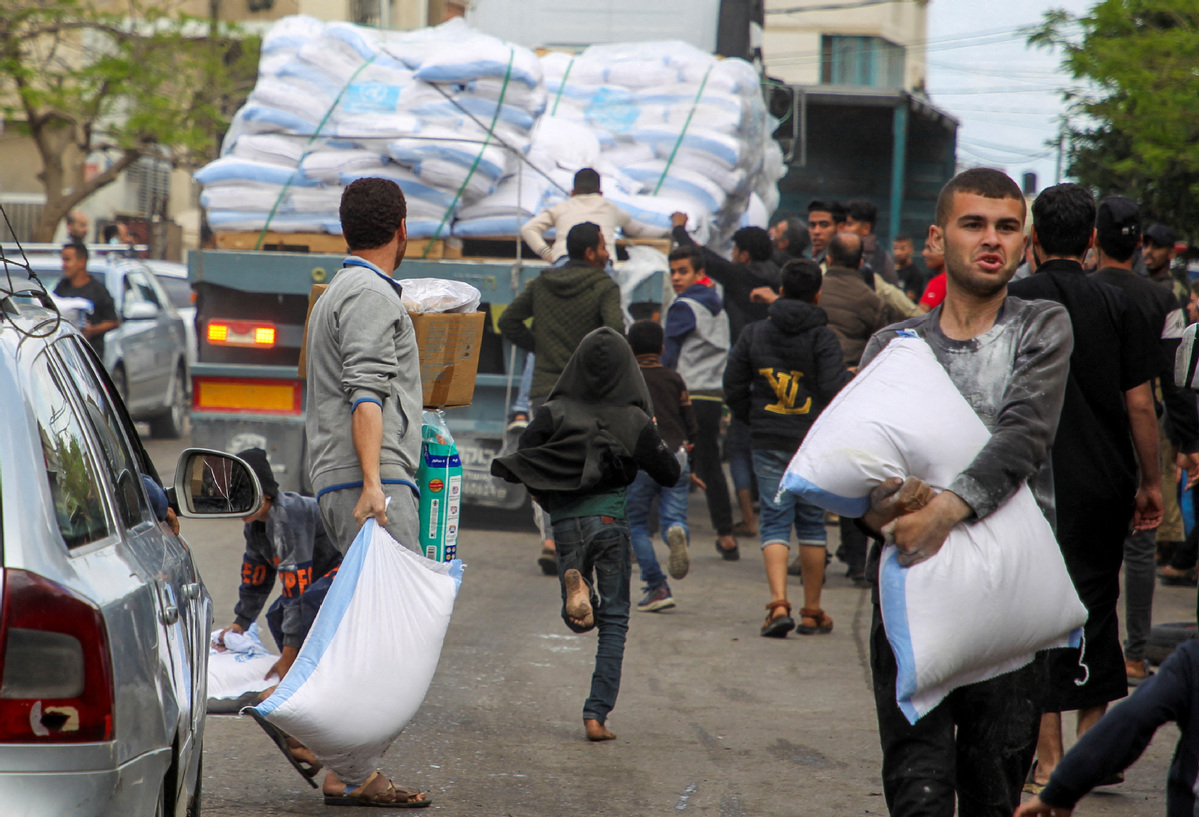
GAZA -- The Israeli army carried out on Monday airstrikes on areas in eastern Rafah in the southern Gaza Strip, said Palestinian security sources and eyewitnesses.
Sources and eyewitnesses told Xinhua that Israeli airstrikes created fire belts in the vicinity of Gaza Airport and on the outskirts of the Al-Salam neighborhood, east of Rafah.
The raids caused large explosions and inflicted significant damage on nearby structures, with no injuries reported yet.
Before the attacks started, the Israeli army had called on the Palestinian civilian population to temporarily evacuate from eastern Rafah.
Avichai Adraee, a spokesperson of the Israeli army, said in a press statement that "for all people who live in the neighborhoods of Al-Salam, Al-Jeneina, Tabba Zaraa, and Al-Byouk in the Rafah area in blocks 10-16, 28, and 270, the army will work with extreme force against terrorist organizations there."
Israel considers Rafah the last major stronghold of Hamas in the Gaza Strip. Located in the southernmost part of the Strip, Rafah shelters approximately 1.4 million Palestinians.
Israel launched a large-scale offensive against Hamas in Gaza on Oct 7, 2023, following Hamas's surprise attack on southern Israel that killed about 1,200 people.

AMMAN - The Jordan Armed Forces-Arab Army said on Sunday that it has carried out five airdrops of humanitarian and food aid targeting several locations in northern Gaza Strip.
The airdrops included relief and humanitarian aid to support the people in the Gaza Strip, the state-run Petra news agency reported.
The operation involved aircraft from the Royal Jordanian Air Force, Egypt, the United States and Germany.
The armed forces said they will continue to send humanitarian and medical aid via an air bridge whether by flights from the country's Marka Airport towards El-Arish International Airport in Egypt, airdrops on the Gaza Strip, or land aid convoys.
The Jordanian Armed Forces has conducted 92 airdrops since the start of the current Palestinian-Israeli conflict, as well as 231 airdrops in collaboration with other countries.

It has been more than 50 years since the United States saw college students launch anti-Vietnam War protests across the nation.
Now, students have again become the front line in a new conflict — this time as Israel fights Hamas in Gaza.
It was Columbia University in New York City that sparked the anti-war protests in 1968 when students seized five buildings, including Hamilton Hall. On April 30, pro-Palestinian demonstrators occupied the hall, just as their predecessors had done 56 years ago to protest against the Vietnam War.
Columbia has again become the epicenter of demonstrations that have spread nationwide to 46 other campuses and led to more than 2,400 arrests, The Associated Press reported.
"When you're going to Columbia, you know you're going to an institution which has an honored place in the history of American protest," said Mark Naison, professor of history and African and African American studies at Fordham University in New York and a participant in the 1968 demonstrations.
"Whenever there is a movement, you know Columbia is going to be right there," Naison told AP.
Sara M, who requested anonymity, is a freshman at Fordham's Bronx campus. On Wednesday, she went to Fordham's Lincoln Center campus in Manhattan and joined protesters.
"I went because we should protest any war," she told China Daily, but "especially against what is happening in Gaza."
She joined protesters in a building where they had erected tents, but left when the school announced demonstrators could be arrested. On Wednesday evening, police made 15 arrests after clearing the campus of demonstrators at the request of the university.
A doctoral student in the humanities program at the University of Maryland in Baltimore, who asked to remain anonymous, told China Daily: "I understand the concern and anger of these young students about the humanitarian disaster, but I don't think they will get anywhere by camping out like this in protest."
She said in a few years they might view their fervor and quest for justice as "ridiculous". "As I get older and see more and more, including (President Joe) Biden saying he won't change his Israel policy, I find what I learn in textbooks and what I see in reality to be very misaligned," she added.
Quito Ziegler, a humanities professor at the School of Visual Art in New York, said: "I think it's atrocious that the administrations of these schools are calling the police on their own students, who are peacefully protesting issues that are profoundly important to them. This generation of students has inherited a world rife with problems, some of which are now leading to genocide."
A 21-year-old SVA student majoring in animation who asked to remain anonymous said: "It's just very brutal. Millions of people in Gaza are being displaced. It's very ironic for America to call out democratic or undemocratic practices in other countries when it itself exercises very undemocratic actions, such as arresting peaceful protesters and intimidating student protesters. They just arrest students. If colleges are institutions meant to educate, this is not the way to do it."

Protests spread
Pro-Palestinian demonstrations that started in the US have spread across the world to London, Paris, Toronto, Rome, Sydney, Tokyo and Beirut.
College officials' responses to the protests have occurred against a global debate over the US' role in the conflict, while both major US political parties have been jockeying for the moral and political high ground.
After weeks of pro-Palestinian protests on campuses nationwide, threats of arrests and expulsions have caused many to shut down as schools end the academic year this month.
However, protests have lingered at some colleges including the University of Virginia, New York University and the New School in New York.
At the University of Virginia, a small group of protesters that included students, faculty and community members set up an encampment on the Charlottesville campus.
They sang songs, read poetry and painted signs to protest "Israel's war in Gaza". However, the peaceful protest ended on Saturday when state police stormed the encampment. Photos on social media showed police in tactical gear with riot shields using tear gas and force to disperse the protesters. At least 25 pro-Palestinian demonstrators were arrested on Saturday, The Washington Post reported.
After the encampment was cleared, police began to push against a growing crowd of protesters, some of whom had come out to support the original demonstrators, and others who were there to witness the scene unfold. Police indiscriminately sprayed tear gas into the crowd, according to the Daily Progress newspaper.
Meanwhile, early on Friday morning, police cleared two pro-Palestinian encampments and arrested student demonstrators at New York University. Student demonstrators had been sleeping in tents inside a New School building and on sidewalks outside NYU buildings in downtown New York.
New York Police Department officials said they acted after the two universities asked for assistance to disperse the illegal encampments. Police arrested 13 people at NYU and 43 at the New School.
NYU President Linda Mills defended the decision to ask for police help, saying that the university leadership "could not tolerate the risk of violence any longer".
In explaining her decision, Columbia President Minouche Shafik said she asked police to end the demonstrations as the protests had pushed the university to the brink.

Divestment demands
Pro-Palestinian demonstrators across the US have accused Israel of committing genocide against Palestinians. However, Jewish students who support Israel and its right to defend itself against Hamas say the protests have made them afraid to walk freely on campus.
Some said denunciations of Zionism and calls for a Palestinian uprising are an attack on the Jewish people.
Many of the pro-Palestinian student demonstrators have called for their universities to make transparent all financial holdings and divest from companies and funds they believe are profiting from or supporting Israel and its policies.
They have also demanded an "amnesty" for students and faculty members who have been disciplined by their schools as a result of protest action.
However, experts have warned that divestment is virtually impossible. Universities probably have very few if any direct ties to companies that are based in Israel or are weapons manufacturers, they said.
Nicholas Dirks, the former chancellor of the University of California, Berkeley, told CNN: "The economy is so global now that even if a university decided that they were going to instruct their dominant management groups to divest from Israel, it would be almost impossible to disentangle".
Many of the protests stopped short of physical confrontations, but clashes included a violent attack last week by pro-Israel protesters at the University of California, Los Angeles, while racist taunts and abuse were hurled by white students at protesters at the University of Mississippi.
New York police arrested 282 people on Tuesday night during crackdowns at Columbia University and the City College of New York. Of those, 74 faced misdemeanor or more serious charges and another 16 had outstanding warrants, prosecutors said. About half of those arrested had no affiliation with either school.
Rights versus wrongs
During the demonstrations, schools have weighed up free expression, including the right to peaceful protest, against safety risks and ensuring that protests don't encroach upon the rights of students, faculty and staff members.
Now many schools are wrestling with how to handle possible student protests during graduation ceremonies. Some schools plan to set up designated areas for protests to allow ceremonies to go forward without quashing free speech. School administrations are also hiring extra security and screening attendees at venues, AP reported.
A graduation ceremony at the University of Michigan in Ann Arbor on Saturday was briefly interrupted by dozens of pro-Palestinian protesters. As the ceremony got underway, about 75 protesters — many in kaffiyeh, a headdress worn by Arabs, and graduation caps — unfurled Palestinian flags and posters as they marched toward the stage chanting: "Regents, regents, you can't hide! You are funding genocide!"
One demonstrator carried a banner reading, "No universities left in Gaza". Others held Palestinian flags while others waved Israeli flags.
Campus police prevented the protesters from reaching the stage. US Navy Secretary Carlos Del Toro paused a few times during his remarks at the ceremony, saying at one point, "Ladies and gentlemen, if you can please draw your attention back to the podium."
A plane flew over the ceremony trailing a banner that said: "Divest from Israel now! Free Palestine".Another plane had a different message: "We stand with Israel. Jewish lives matter".
Officials said no one was arrested, and the protest did not seriously interrupt the nearly two-hour event, which was attended by tens of thousands of people.
Graduations rethink
At least two schools have altered their graduation ceremonies in light of the ongoing protests.
The University of Vermont announced on Friday that Linda Thomas-Greenfield, the US ambassador to the United Nations, would not deliver a commencement address scheduled for later this month.
The University of Southern California canceled its valedictorian commencement speech and appearances by celebrity speakers and its "main stage" commencement ceremony, citing the possibility of disruptions. On Friday, the university announced a "Trojan Family Graduate Celebration "in the Los Angeles Memorial Coliseum for graduates to attend instead.
To head off possible disruptions of final exams and graduation ceremonies, a number of universities have struck deals with protesters, including Brown in Rhode Island, Northwestern in Illinois and Rutgers in New Jersey, CBS News reported on Saturday.
The deals included commitments by universities to review their investments in Israel, but with no promises about changing such investments.
"I think for some universities, it might be just a delaying tactic to defuse the protests," Ralph Young, a history professor who studies American dissent at Temple University in Philadelphia, told CBS News. "The end of the semester is happening now. And maybe by the time the next semester begins, there is a cease-fire in Gaza."
Columbia University is rethinking its commencement ceremony planned for May 15, according to a source at the university, NBC News reported.
Administrators indicated to student leaders at a meeting that they were unsure about the ceremony being held at the main campus in Manhattan because of security concerns.
A student representative said Columbia's administration was primarily concerned about outside protesters and was seeking an alternative venue.
The student leaders told the university that many students were concerned about school president Shafik speaking at the ceremony. "Her presence would be the cause of a lot of upset," one of them told NBC News.
In her message to the Columbia University community on why she requested police help to end the protests, Shafik said the students had paid a "high price", and missed out on the final days of the year in classrooms and residence halls.
"For those of you who are seniors, you're finishing college the same way you started: online," she said.
Xin Wen in Beijing contributed to this story.

GAZA -- The Palestinian death toll from ongoing Israeli attacks on the Gaza Strip has risen to 34,683, said the Hamas-run health authorities in a press statement on Sunday.
It added that the Israeli army killed 29 people and wounded 110 during the past 24 hours, bringing the total death toll to 34,683 and injuries to 78,018 since the Palestinian-Israeli conflict broke out last October.
The statement noted that some victims remained under the rubble amid heavy bombardment and a lack of civil defense and ambulance crews.
Israel has been launching a large-scale offensive against Hamas in the Gaza Strip to retaliate against a Hamas rampage through the southern Israeli border on Oct 7, 2023, during which about 1,200 people were killed and more than 200 were taken hostage.
GAZA -- No positive progress has been made in the Gaza truce talks on Saturday, a source from the Islamic Resistance Movement (Hamas) said.
The source, who spoke on condition of anonymity, told Xinhua that the negotiations encountered challenges due to Israel's insistence on not committing to a (permanent) ceasefire.
Hamas demanded in the deal an Israeli pullout from Gaza and a complete end to the conflict, conditions that Israel has been rejecting.
An earlier report from Al Arabiya News channel said Hamas had agreed to release 33 hostages, instead of the initial 20, in the first phase of the ceasefire deal, as required by Israel.
Hamas delegation arrived in Cairo Saturday to meet the Egyptian mediators on a possible Gaza truce that would see the return to Israel of some hostages.

GAZA -- Hamas has agreed to release 33 hostages in the first phase of a ceasefire deal with Israel, which is still being discussed, Al Arabiya News channel reported on Saturday.

GAZA -- An official source from the Islamic Resistance Movement (Hamas) told Xinhua on Saturday that the movement will agree to a complete ceasefire deal with Israel "in stages".
The source said there should be clear international guarantees that Israel would adhere to the ceasefire and completely end the conflict in the Gaza Strip.
The source refused to talk about more details about the terms of the agreement, pointing out that certain points need to be clearly defined and discussed by the Hamas delegation, who arrived in Cairo Saturday to meet the Egyptian mediators.
Israel has yet to respond to the Hamas proposal.

CAIRO -- Egyptian mediators and Hamas have reached a consensus on several issues regarding a potential ceasefire in the Gaza Strip, Egyptian media reported on Saturday.
Egypt's Al-Qahera News TV channel quoted an unnamed senior official as saying that a Hamas delegation had arrived in Cairo to discuss the terms of an Egypt-proposed initiative for a ceasefire with Israel.
Earlier in the day, two Egyptian sources told Xinhua on condition of anonymity the Hamas delegation arrived in Cairo on Saturday "with the intention of concluding and implementing a truce agreement with Israel."
The Hamas delegation's visit came after the Gaza-ruling movement got Egypt's guarantees that the deal could lead to a ceasefire in the besieged enclave, the sources said.
Egypt has warned Hamas of the potential escalation of tensions in Gaza should they fail to reach an agreement, according to the sources.
It has been reported that William Burns, director of the US Central Intelligence Agency, is scheduled to visit Egypt. The visit is part of the efforts by the tripartite guarantors of the ceasefire deal, which include Egypt, the United States, and Qatar.
Israel launched a large-scale offensive against Hamas in Gaza on Oct 7, 2023, following Hamas's surprise attack on southern Israel that killed about 1,200 people.
The ongoing Israeli attacks on the Gaza Strip have killed more than 34,600 Palestinians, and wounded over 77,800 others, according to Gaza health authorities. The attacks also led to massive destruction of homes and infrastructure in Gaza.

CAIRO - Hamas has sent a delegation to Cairo in response to an Egypt-proposed initiative for a truce with Israel in the besieged Gaza Strip, two Egyptian sources told Xinhua Saturday on condition of anonymity.
"Egypt was informed by Hamas that a delegation from the movement was heading to Cairo on Saturday with the intention of concluding and implementing a truce agreement with Israel," they said.
Hamas responded to the initiative proposed by Egypt after getting Egyptian guarantees that it could lead to stopping the conflict in Gaza, they added.
Cairo, they said, warned Hamas of the escalation of the situation in Gaza if an agreement was not reached.
CIA Director William Burns will go to Egypt as part of the tripartite guarantors of the deal, namely Egypt, the United States and Qatar, they noted.
A Hamas delegation visited Cairo on Monday and then left to prepare a written response to the truce proposal for the ensuing meeting, Egypt's state-affiliated Al-Qahera News TV channel quoted an unnamed official as saying on Monday.
The Egyptian initiative includes three stages, aimed at exchanging Israeli hostages and Palestinian prisoners, taking necessary measures to reach a ceasefire, and restoring sustainable calm.
The first phase is 40 days, and it stipulates a temporary halt of military operations between the two sides, an exchange of detainees and prisoners, and the return of internally displaced civilians to their areas of residence in Gaza.
It intends to facilitate the entry of intensive and sufficient quantities of humanitarian aid, relief materials and fuel into Gaza, as well as the equipment needed to remove rubble and rehabilitate and operate hospitals, health centers and bakeries in the enclave.
The proposed deal also aims to facilitate the entry of the supplies necessary to establish shelter camps to accommodate displaced Palestinians who lost their homes during the conflict.
Cairo, Doha and Washington mediated a week-long truce between Israel and Hamas that ended in late November 2023, which included a swap between Palestinian prisoners and Israeli hostages as well as more humanitarian aid delivery to Gaza.
Israel estimates that there are about 134 Israeli hostages in Gaza, 70 of whom Hamas said were killed in random Israeli raids.
Israel holds more than 9,000 Palestinians in its prisons, whose conditions have worsened and some of whom have died since Israel began its attacks on Gaza, according to Palestinian organizations.
Israel has launched a large-scale offensive against Hamas in Gaza since Oct. 7, 2023, following Hamas's surprise attack on southern Israel that killed about 1,200 people.
The ongoing Israeli attacks on the Gaza Strip has killed more than 34,600 Palestinians, besides many unreported under the rubble, and wounded over 77,800 others, according to Gaza health authorities. It also led to massive destruction of homes and infrastructure in Gaza.

ISTANBUL -- Turkish President Recep Tayyip Erdogan said Friday that Turkiye's decision to suspend trade with Israel had one singular purpose, which is to compel the Israeli government into a ceasefire in the Gaza Strip.
He made the remarks during a meeting with the board of directors of the Independent Industrialists and Businessmen Association in Istanbul, according to the presidency's website.
The president also noted that the government will coordinate and consult with the business community to manage the consequences of halting trade with Israel.
Turkiye on Thursday halted all trade activities with Israel due to the latter's "non-stop violence" against Palestinians in the Gaza Strip, according to the Turkish Trade Ministry. Erdogan also remarked that this decision would set a precedent for other countries unsettled by the current situation.
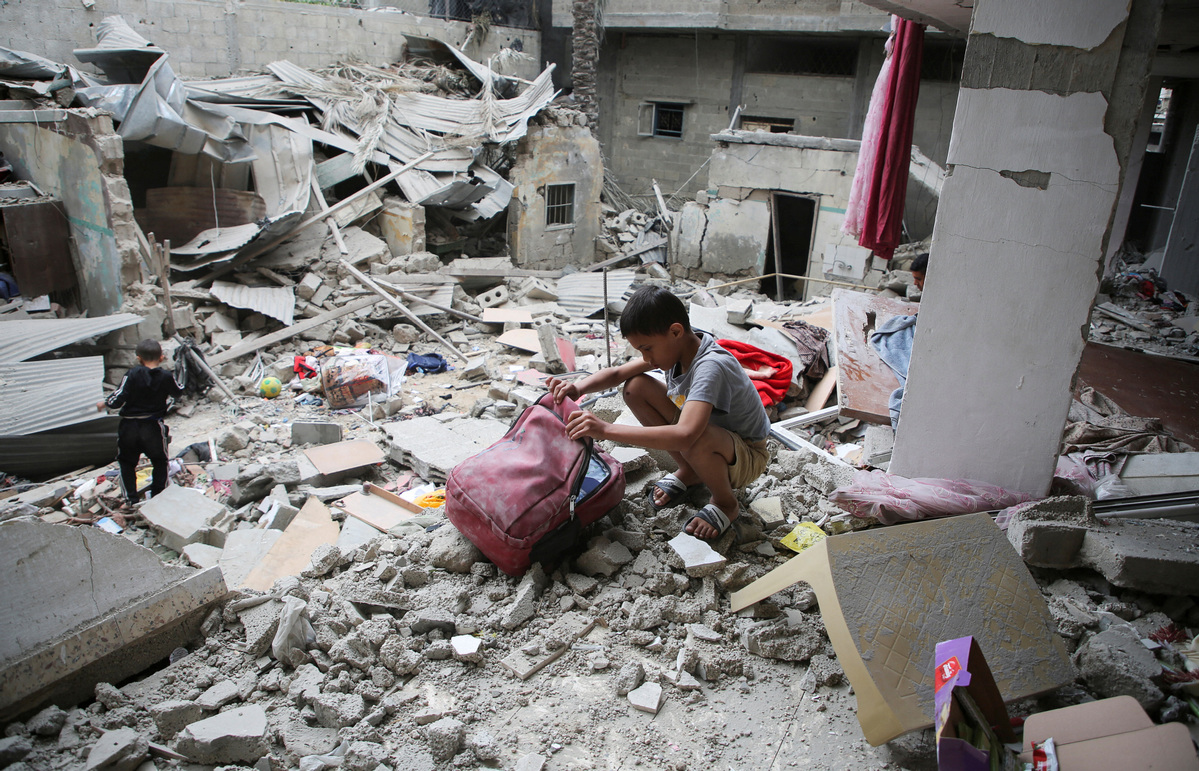
GAZA -- At least 15 Palestinians were killed Sunday night in Israeli airstrikes on three residential buildings in the southern Gaza Strip city of Rafah, Palestinian official news agency Wafa reported on Monday.
Many others were still trapped under the rubble, local sources told Xinhua, adding that civil defense crews were working to rescue them.
The Israeli army killed 66 Palestinians and wounded 138 others during the past 24 hours, bringing the total death toll to 34,454 and injuries to 77,575 since the Israeli-Palestinian conflict broke out on Oct 7, 2023, the Hamas-run Health Ministry said in a statement on Sunday.
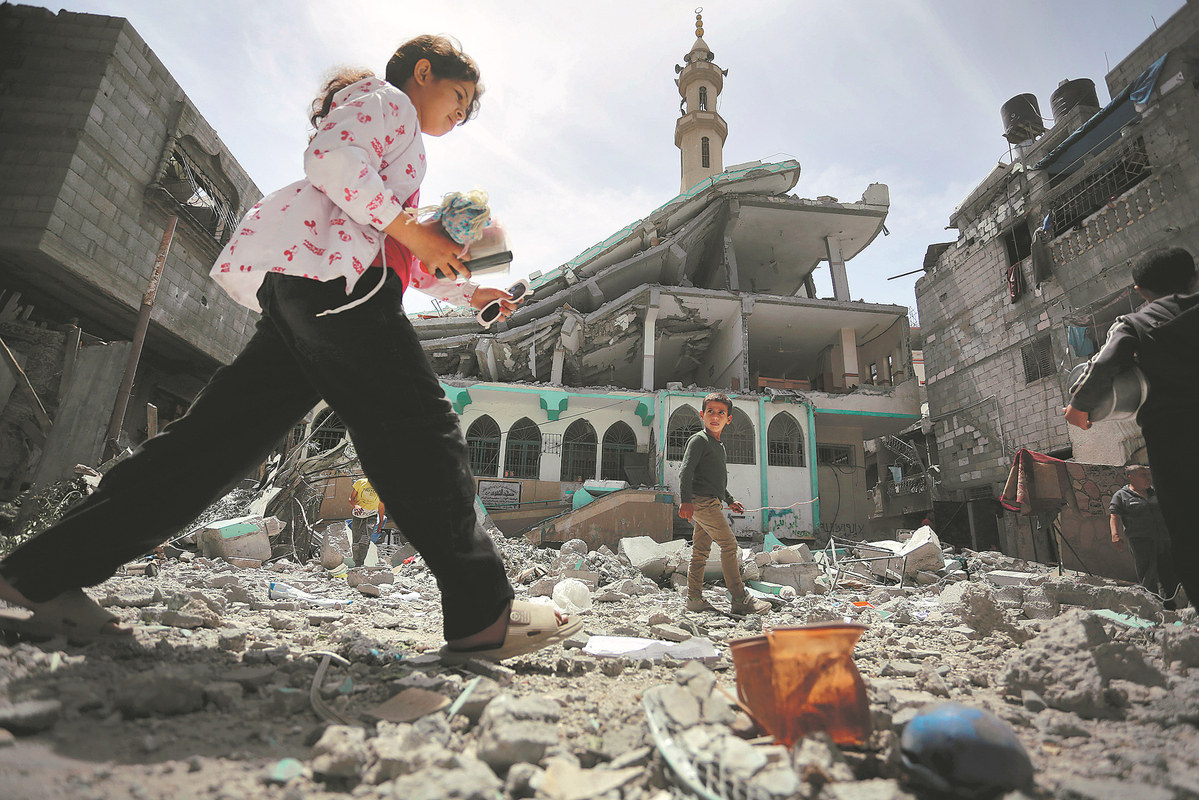
At least 47 people were arrested at Yale University on Monday during pro-Palestinian protests, while new demonstrations broke out at other US campuses over the conflict in Gaza amid growing concerns about the safety of Jewish students.
Pro-Palestinian demonstrators set up encampments at the University of Michigan and at universities in the Boston area, on Sunday night, including at the Massachusetts Institute of Technology, or MIT, in Cambridge, Emerson College in Boston and Tufts University in Medford. Harvard University closed Harvard Yard until Friday in apparent anticipation of demonstrations.
Passover, a major Jewish holiday, started at sundown on Monday night, and some groups have expressed fears for the security of Jewish students who will be celebrating.
US President Joe Biden on Monday condemned antisemitic protests on college campuses and decried "those who don't understand what's going on with the Palestinians", without expanding on what he meant.
As the New York Police Department built up a large presence around Columbia University on Monday, New York Governor Kathy Hochul visited the campus to address security concerns.
"Students are scared," Hochul said in a video posted on X. "They are afraid to walk on campus. They don't deserve that."
School administrators have tried to defuse the protests while balancing the free speech rights of protesters and the fears of many Jewish students, who said some of the demonstrations have veered into antisemitism.
At Columbia, where police last week arrested more than 100 pro-Palestinian demonstrators who had set up an encampment, the university canceled in-person classes on Monday.
Growing encampment
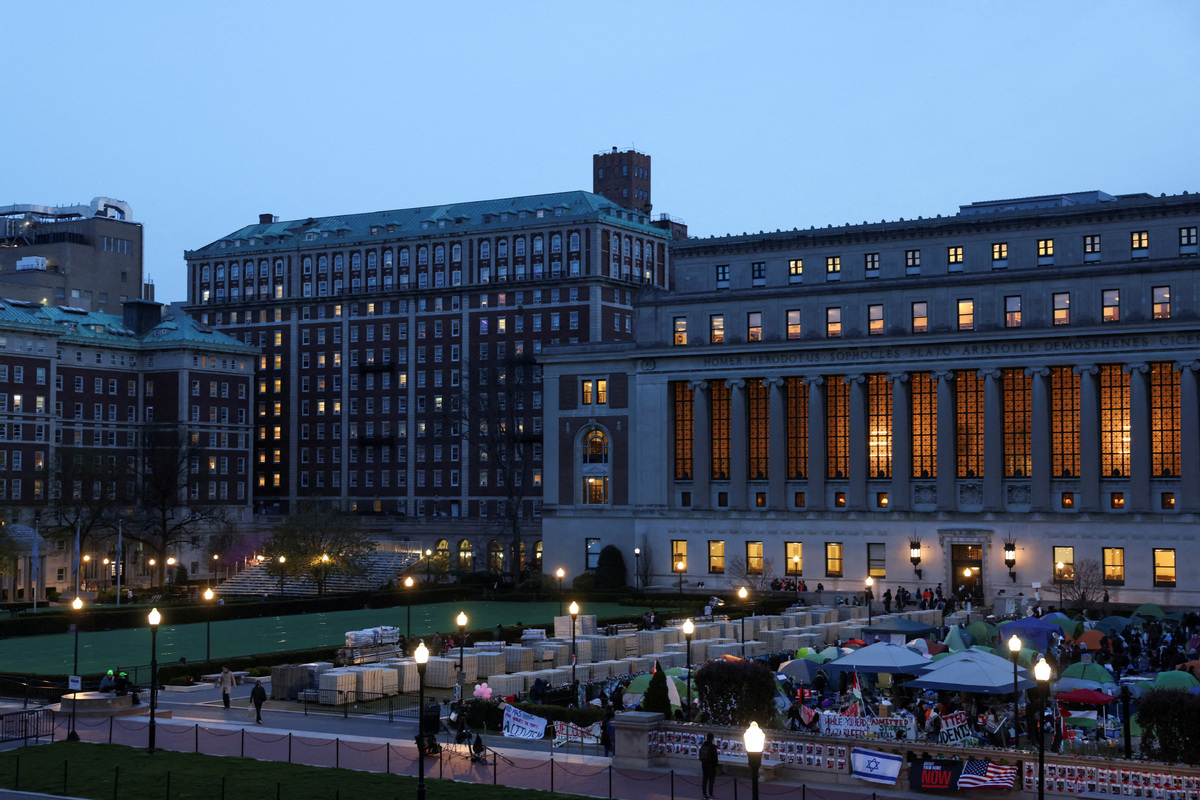
The scene at Columbia University's growing encampment appeared quiet on Monday morning although there were about 70 green, blue and yellow tents on the lawn in front of the school library.
Early Monday, Columbia University President Nemat Shafik said that school leaders would be coming together to discuss a way to bring an end to "this crisis".
In a statement to the university community, Shafik said: "These tensions have been exploited and amplified by individuals who are not affiliated with Columbia who have come to campus to pursue their own agendas."
US Representative Elise Stefanik, a New York Republican who questioned Shafik at a congressional hearing last week about antisemitism on the campus, wrote her a letter calling on her to resign, saying that "anarchy has engulfed the campus".
New England Patriots football team owner Robert Kraft, a Columbia alum, whose name is on the Jewish student center he helped to fund, released a statement Monday saying he no longer supports the university.
"I am no longer confident that Columbia can protect its students and staff and I am not comfortable supporting the university until corrective action is taken," Kraft said.
The health ministry in Hamasrun Gaza said at least 34,183 people have been killed in the territory as the conflict marked its 200th day on Tuesday.
Hebrew Public Radio reported on Monday that Israel was preparing to expand a "humanitarian zone" in the Gaza Strip in preparation for a possible attack on Rafah.
Agencies contributed to this story.
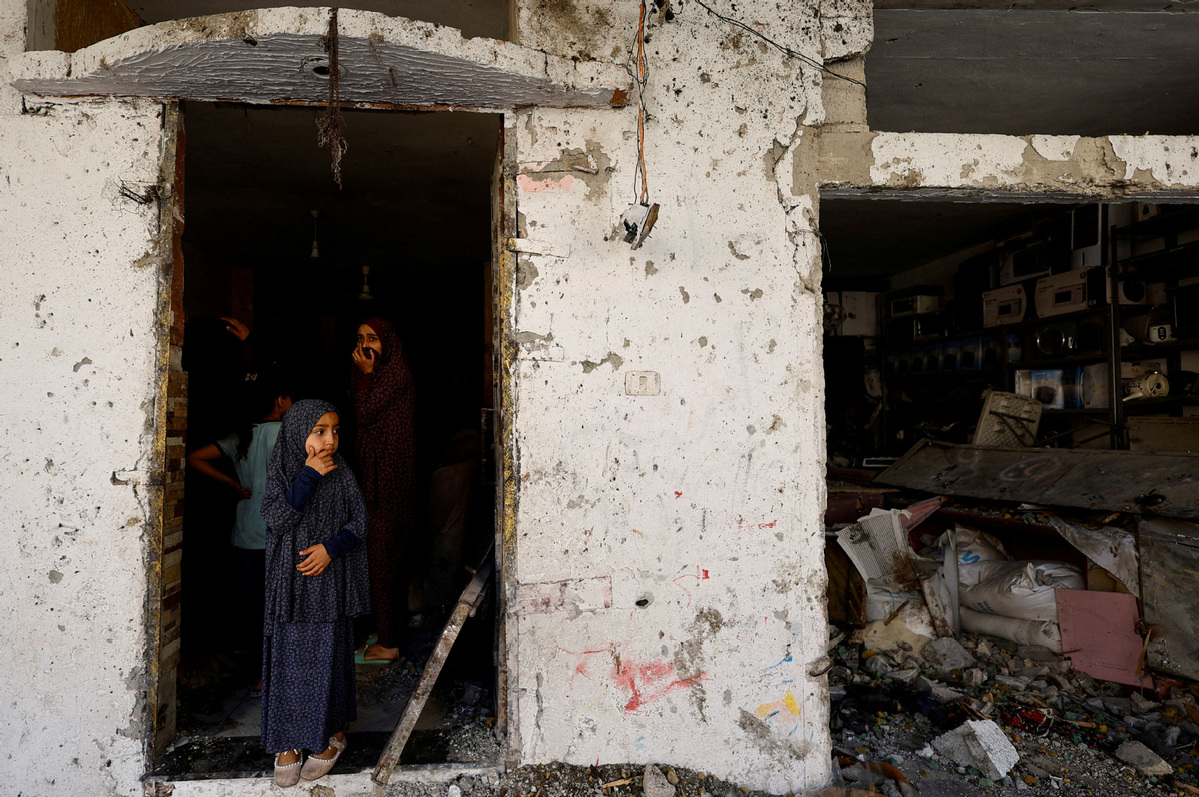
GAZA -- At least 13 Palestinians were killed in an Israeli airstrike targeting a gathering of Palestinians in the northern Gaza Strip, local eyewitnesses and medical sources said on Wednesday.
Eyewitnesses told Xinhua that a drone attacked a gathering of Palestinians trying to access the internet in the Sheikh Radwan neighborhood in Gaza City.
Medical sources told Xinhua that at least 13 Palestinians died at the scene, and several others sustained varying degrees of injuries had been transported to the hospital.
The Israeli media reported that a nephew of Hamas politburo leader Ismail Haniyeh was killed in the airstrike.
Meanwhile, Palestinian security sources said that the Israeli army demolished a residential square in the Nuseirat refugee camp in the central Gaza Strip, which has been the site of a military operation for almost a week.
The sources added that the Israeli military intensified aerial and artillery bombardment on the northern outskirts of the camp, where clashes broke out with Palestinian factions.
On April 11, the Israeli army announced the start of a surprise military operation in the middle Gaza Strip as a part of the ongoing war against Hamas for over six months.
Israel has been launching a large-scale offensive against Hamas in the Gaza Strip to retaliate against a Hamas rampage through the southern Israeli border on Oct. 7, 2023, during which about 1,200 people were killed and more than 200 were taken hostage.
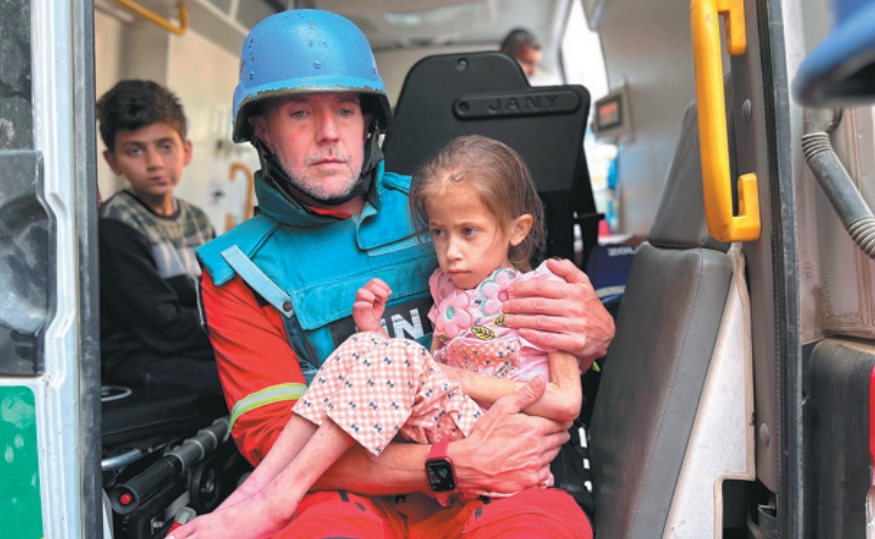
Senior leaders in the Middle East have appealed to the international community to do more to de-escalate tensions in the region as frustrations grow over the delayed cease-fire and flow of humanitarian aid in Gaza despite resolutions to end the atrocities.
Tensions intensified after Iran launched retaliatory strikes on Israel in response to the Israeli bombing of an Iranian diplomatic building in Syria's capital Damascus on April 1, which killed at least one senior figure in Iran's Islamic Revolutionary Guard Corps and six other officers plus six Syrians.
Iranian President Ebrahim Raisi had said that any "reckless" action by Israel would be met with a harsher and stronger response, according to a report by the Iranian Students' News Agency reported on April 15. ISNA is based in Teheran and is run by university students.
Raisi said that over the past six months, "and mainly in the last 10 days", Iran had used all regional and international means to warn the international community of "the dangers of the ineffectiveness of the UN Security Council", which is "under the influence of the US and the supporters of Israel".
Raisi also said that his country considers "peace and stability" in the region essential for Iranian national security, stressing that Iran "would not hesitate in making any effort to restore peace and stability to the region.
Turkish President Recep Tayyip Erdogan, in a televised speech on April 16, blamed Israeli Prime Minister Benjamin Netanyahu for Iran's unprecedented missile attack on Israel over the weekend, the Times of Israel reported.
"Those who have been silent for months about Israel's aggressive attitude immediately condemned the Iranian response. But it's Netanyahu himself who is the first who should be condemned," Erdogan was quoted as saying by the Times of Israel.
Before the Iranian retaliation over the weekend, pressure had been piling on Israel over its defiance of the United Nations Security Council Resolution 2728, which called for an immediate cease-fire in Gaza.
It received international indignation over the Israel army's killing of seven aid workers from World Central Kitchen on April 1 after strikes hit their three-vehicle convoy despite being clearly marked with the charity's logos.
Reuters reported on April 15 that Israel's war cabinet discussed a range of options to punish Iran for its drone and missile attack but without triggering an all-out war, citing Israel's Channel 12 news report.
Speaking at a press conference during his visit to Pakistan on April 16, Saudi Foreign Minister Prince Faisal bin Farhan Al Saud lamented that international efforts toward a cease-fire had been "wholly insufficient".
"We are now well beyond 33,000 civilians killed. We are now actively discussing the potential of famine in Gaza. Again, famine. That means people are starving to death because humanitarian assistance is not getting to them," said Prince Faisal, as he called it "an unacceptable situation".
"It is a complete failure of the international system and the systems of international law and governance to live up to their responsibilities," he said.
"We must have a cease-fire now and we must have access to humanitarian aid immediately. There is no justification for the restriction of humanitarian aid in entering Gaza," he added.
Prince Faisal also expressed frustration that despite two United Nations Security Council resolutions, sufficient aid had not been entering Gaza and slammed the double standards of Western countries.
"We have finally now started to see a turnaround in the issue of aid. Unfortunately, that happened after six Western aid workers were killed by Israel but it didn't happen after 33,000 Palestinians were killed. So, this shows you the continuing double standard that we have to deal with and we have to live with," said Prince Faisal.
He said the reality was that the international community was "not living up to its responsibility" and demanded more be done to "end the killing, end the suffering of the people of Gaza".
"It is our position that de-escalation must be everybody's priority," said Prince Faisal.
Francesca Albanese, the United Nations Special Rapporteur on the human rights situation in the West Bank and Gaza, had said that she hoped Iran's military response to Israel's bombing of the Iranian embassy in Syria "doesn't escalate into a full-blown war".
"At the same time, I urge everyone to remain committed to stop Israel's genocide in Gaza and its brutal violence in the West Bank. This is the only path to peace in the region and beyond," Albanese wrote on X, formerly Twitter.
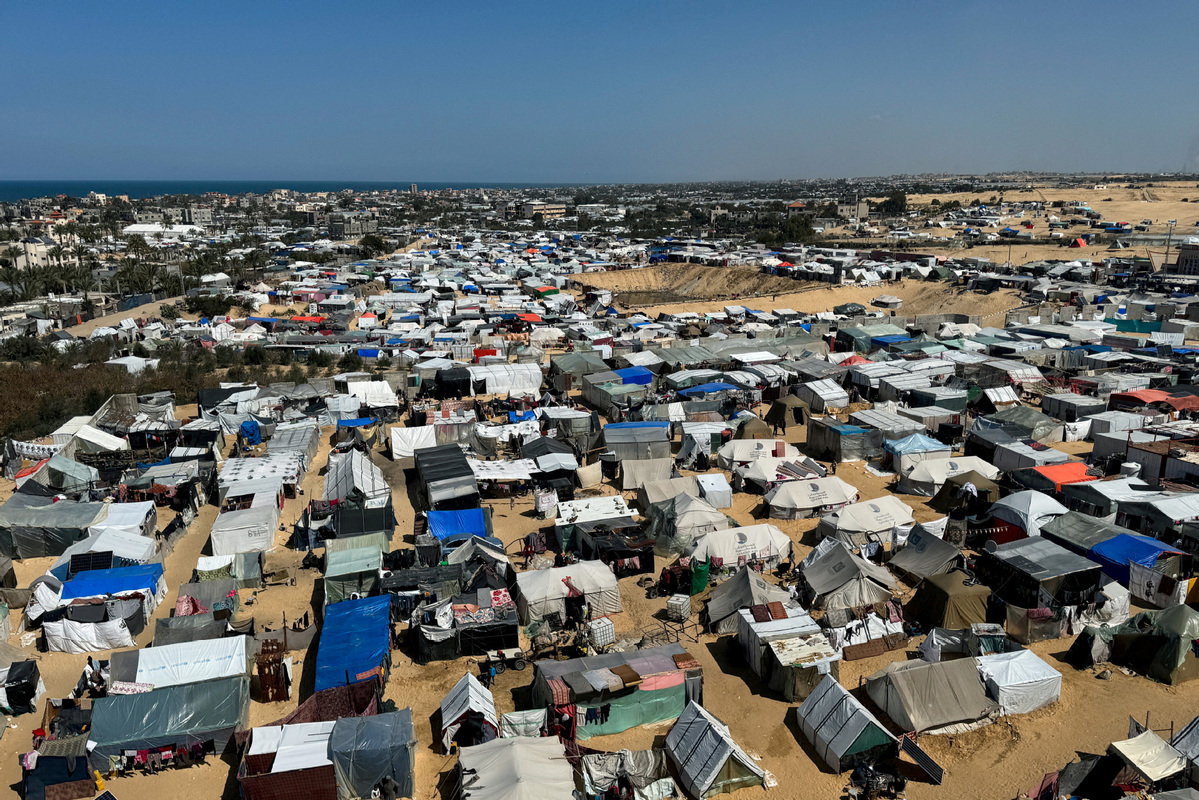
GAZA -- The Israeli army has sent tanks to the northern Gazan city of Beit Hanoun and ordered residents to evacuate, the Hamas-run government media office said Tuesday.
The office said in a statement that Israeli bulldozers and tanks advanced toward shelter centers in the city and the Israeli army surrounded a school housing hundreds of displaced people.
The Israeli army set up a field investigation center behind the school and demanded everyone inside to leave under threat of weapons, the statement said, adding all families in Beit Hanoun were forced to evacuate, and several young men were arrested.
"The new crime was committed under the cover of intense aerial and artillery bombardment and heavy gunfire," the statement said, adding that military vehicles were still present east of Jabalia and Beit Hanoun.
The statement urged the international community to hold the Israeli army accountable for displacing residents from their homes, despite their insistence on remaining there amidst inhumane conditions.
So far, Israel has not issued a response to the statement.
Israel launched a large-scale offensive against Hamas in the Gaza Strip to retaliate against a Hamas rampage through the southern Israeli border on Oct 7, 2023, during which about 1,200 people were killed and more than 200 were taken hostage.
China on Monday expressed deep concern about the escalating tensions in the Middle East and called on all relevant parties to exercise maximum restraint and calm, as Special Envoy of the Chinese Government on the Middle East Issue Zhai Jun met with Ambassador of Israel to China Irit Ben-Abba Vitale.
Zhai elaborated China's principled position on the Gaza conflict, saying bloodshed and conflict do not serve the interests of any party and the immediate priority is for the Gaza Strip to cease fire, ensure humanitarian assistance and promptly release all detained individuals.
The Palestinian issue should achieve a political settlement on the basis of the two-state solution, thereby realizing peaceful coexistence between Israel and Palestine.
The Israeli ambassador briefed the situation of Iran's military strikes against Israel on Sunday and expressed Israel's position and concerns regarding the Gaza conflict and other issues.
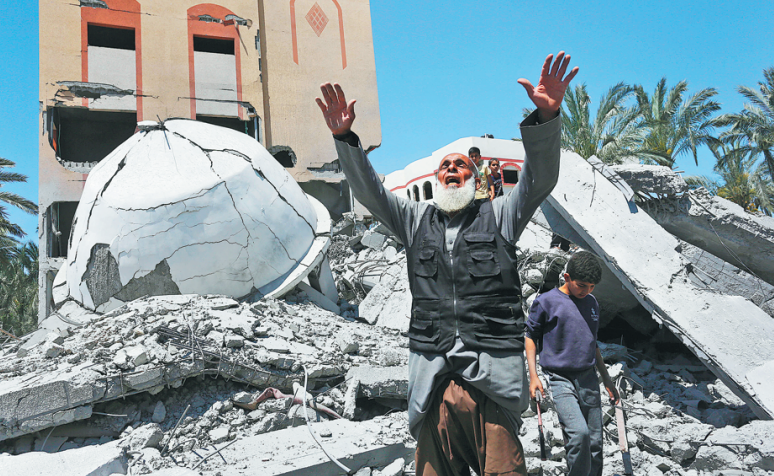
GAZA/JERUSALEM — The Islamic Resistance Movement, or Hamas, announced on Saturday it has responded to mediators in Egypt and Qatar over a proposed cease-fire in the Gaza Strip and reaffirmed its demands.
The movement said in a press statement that it has "submitted its response to the Egyptian and Qatari mediators on the proposal it received last Monday", without giving further details.
Hamas meanwhile reiterated its demands for a permanent cease-fire, the withdrawal of all Israeli forces from the Gaza Strip, the return of displaced Palestinians to their homes, the facilitation of relief supplies and aid into Gaza, and the start of reconstruction efforts in the coastal enclave.
The statement emphasized the movement's readiness to conclude a "serious and genuine" prisoner-hostage exchange deal with Israel that the faction had received on April 8.
Later, the Israeli Prime Minister's office said Israel rejected the "unfounded demands" of Hamas for an end to the conflict and a complete withdrawal of its troops from Gaza.
In an immediate response to Hamas' remarks, the office said the Israeli cabinet and the security forces are united in their opposition to these demands.
The office said political instruction given to negotiations focuses on "achieving the release of our hostages and maintaining Israel's security".
It argued that the only obstacle to obtaining the release of the Israeli hostages is Hamas and "not any factor on the Israeli side", and that Hamas "has refused any deal and any compromise proposal".
Cairo hosted a new round of indirect negotiations between Israel and Hamas on April 8, in a new attempt to reach agreements leading to a cease-fire and a prisoner exchange.
Qatari and Egyptian mediators, in addition to the United States, seek to reach a deal for a prisoner exchange and a second truce between Israel and Hamas, following the first one that lasted a week until the beginning of December.
The health ministry in Hamas-run Gaza said on Sunday that at least 33,729 people have been killed in the territory during the conflict. On the Israeli side, about 1,200 were killed.
Thousands of Israelis rallied against their government on Saturday, with some demanding Prime Minister Benjamin Netanyahu halt fighting in Gaza.
As concern mounts in Israel for the well-being of the remaining hostages, their families and friends have organized increasingly vocal demonstrations.
"Our country's near the abyss. We've already started to drive down and we must stop it. I'm here to gather the force to tell the people that they need to come out and they need to tell our government that it's time to stop," said Marva Erez, 45, who was among demonstrators in Tel Aviv.
Xinhua - Agencies
